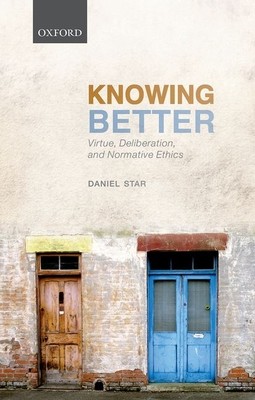
- We will send in 10–14 business days.
- Author: Daniel Star
- Publisher: Oxford University Press, USA
- ISBN-10: 0199570418
- ISBN-13: 9780199570416
- Format: 13.7 x 21.8 x 2 cm, hardcover
- Language: English
- SAVE -10% with code: EXTRA
Reviews
Description
Knowing Better presents a novel solution to the problem of reconciling the seemingly conflicting perspectives of ordinary virtue and normative ethics. These two perspectives appear to tell us incompatible things about the practical reasons that guide our deliberation and justify our actions. Normative ethics is a sophisticated, open-ended philosophical enterprise that attempts to articulate and defend highly general ethical principles. Such principles aspire to specify our reasons, and tell us what it is right to do. However, it is not attractive to suppose that virtuous people generally follow such principles, or that the reasons that they specify are familiar to them. These principles are difficult to articulate and assess, and we do not (or should not) think that advanced philosophical expertise is a necessary requirement for virtue. At the same time, the virtuous do not only accidentally get things right; rather, they act well in a reliable fashion, and they do so byresponding appropriately to genuine reasons. How is it possible for there to be genuine reasons that the virtuous are able to rely on to determine what they should do, given that they are, generally speaking, ignorant of fundamental ethical principles and the reasons that they specify? Daniel Star argues that the solution to this problem requires a new approach to understanding the relation between ethical theory and ordinary deliberation, a new way of thinking about the nature of practical authority and normative reasons, a new account of the nature of virtue, and a rethinking of how best to understand the role that knowledge plays in deliberation and action.
EXTRA 10 % discount with code: EXTRA
The promotion ends in 18d.15:09:47
The discount code is valid when purchasing from 10 €. Discounts do not stack.
- Author: Daniel Star
- Publisher: Oxford University Press, USA
- ISBN-10: 0199570418
- ISBN-13: 9780199570416
- Format: 13.7 x 21.8 x 2 cm, hardcover
- Language: English English
responding appropriately to genuine reasons. How is it possible for there to be genuine reasons that the virtuous are able to rely on to determine what they should do, given that they are, generally speaking, ignorant of fundamental ethical principles and the reasons that they specify? Daniel Star argues that the solution to this problem requires a new approach to understanding the relation between ethical theory and ordinary deliberation, a new way of thinking about the nature of practical authority and normative reasons, a new account of the nature of virtue, and a rethinking of how best to understand the role that knowledge plays in deliberation and action.


Reviews